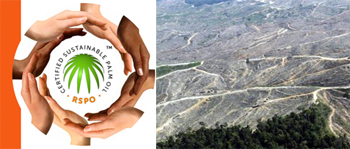A trade group for embattled palm oil producers and sellers is looking for PR help for a global outreach campaign targeting influential journalists, bloggers, NGOs and activists.
Environmental campaigns have targeted palm oil -- used for cooking and as an ingredient in myriad products ranging from candy and soap to biofuel – because most of the global yield comes from land cleared of rainforest in Indonesia and Malaysia.
 RSPO logo and a Greenpeace photo showing deforestation for palm oil production in Indonesia. |
The group, which also has offices in Malaysia and Indonesia, counts 1,300 members from 50 countries and certifies about 15% of global palm oil shipments as "sustainable" with its RSPO brand, a designation criticized by some green groups.
Hill+Knowlton Strategies currently works with the RSPO abroad. Prism Public Affairs advises The American Palm Oil Council, a D.C.-based offshoot of the Malaysian Palm Oil Council.
The Roundtable feels the global debate on palm oil is gaining traction, particularly in Europe, making consumers uneasy. "[Consumers] get the general feeling that something is not right about palm oil but are not well informed of the specific details," reads the RFP. "In addition to this – the negative buzz surrounding palm oil combined with the lack of any positive proactive communications with end consumers triggers an immediate reaction towards boycotting palm oil altogether."
Starbucks, Nestle and the Girl Scouts are among entities in the U.S. that have faced consumer pressure to curb or stop the use of palm oil in their products.
Some of the U.K.'s biggest cookie makers – Marks & Spencer, United Biscuits, among others – this month vowed to reduce the amount of palm oil used in the products after pressure from consumers and green groups. Companies marketing food products in the European Union will be required to label products containing palm oil starting in late 2014.
Targets of the PR push include environmental and food bloggers, mainstream and online consumer media, academics, NGOs and other groups. The industry wants to position its RSPO trademark among consumers, pitch the sustainability story, and "convert" influencers into advocates of its program.
Proposals are due Aug. 12. View the RFP (PDF).


 A focus on all the ways that greenhouse gases are created, not just from fossil fuels, marks the evolution from clean energy and clean tech to climate tech, according to Melissa Mahoney from V2 Communications.
A focus on all the ways that greenhouse gases are created, not just from fossil fuels, marks the evolution from clean energy and clean tech to climate tech, according to Melissa Mahoney from V2 Communications. Kristin Wilson-Palmer, who has been a senior VP in Edelman’s Washington, DC office since 2021, joins the Natural Resources Defense Council as chief communications officer.
Kristin Wilson-Palmer, who has been a senior VP in Edelman’s Washington, DC office since 2021, joins the Natural Resources Defense Council as chief communications officer. Educating the next generation to the facts and science surrounding the climate crisis.
Educating the next generation to the facts and science surrounding the climate crisis. Melanie Janin, who was executive VP at Weber Shandwick, has joined Conservation International as chief communications & marketing officer.
Melanie Janin, who was executive VP at Weber Shandwick, has joined Conservation International as chief communications & marketing officer.



 Have a comment? Send it to
Have a comment? Send it to 
No comments have been submitted for this story yet.